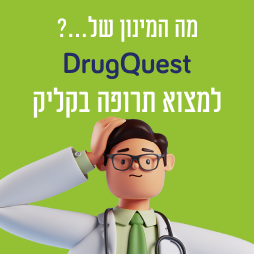Quest for the right Drug
הפאגם B HEPAGAM B (HEPATITIS B IMMUNOGLOBULIN)
תרופה במרשם
תרופה בסל
נרקוטיקה
ציטוטוקסיקה
צורת מתן:
תוך-שרירי, תוך-ורידי : I.M, I.V
צורת מינון:
תמיסה להזרקה : SOLUTION FOR INJECTION
עלון לרופא
מינוניםPosology התוויות
Indications תופעות לוואי
Adverse reactions התוויות נגד
Contraindications אינטראקציות
Interactions מינון יתר
Overdose הריון/הנקה
Pregnancy & Lactation אוכלוסיות מיוחדות
Special populations תכונות פרמקולוגיות
Pharmacological properties מידע רוקחי
Pharmaceutical particulars אזהרת שימוש
Special Warning עלון לרופא
Physicians Leaflet
Pharmacological properties : תכונות פרמקולוגיות
Pharmacodynamic Properties
Mechanism of Action Post-exposure Prophylaxis Clinical studies conducted prior to 1983 with hepatitis B immunoglobulins similar to HepaGam B™ demonstrated the advantage of simultaneous administration of hepatitis B vaccine and Hepatitis B Immunoglobulin (Human), by the intramuscular route. The Centers for Disease Control and Prevention Advisory Committee on Immunization Practices (ACIP) advises that the combination prophylaxis be provided following certain instances of hepatitis B exposure. Recommendations on post-exposure prophylaxis are based on available efficacy data, primarily from studies in neonates. Cases of hepatitis B are rarely seen following exposure to HBV in persons with pre-existing anti-HBs antibodies. Prevention of Hepatitis B Recurrence following Liver Transplantation Hepatitis B virus re-infection is the consequence of an immediate re-infection of the graft due to circulating HBV particles, a re-infection of the graft from HBV particles coming from extra hepatic sites, or both. The mechanism whereby Hepatitis B Immunoglobulin (HBIG) protects the transplanted liver against HBV re-infection is not well understood. One hypothesis is that HBIG protects naive hepatocytes against HBV release from extra hepatic sites through blockage of a putative HBV receptor. Alternatively, HBIG may neutralize circulating virions through immune precipitation and immune complex formation or trigger an antibody-dependent cell-mediated cytotoxicity response resulting in target cell lysis. In addition, HBIG has been reported to bind to hepatocytes and interact with HBsAg within cells. Regardless of the mechanism, there is evidence of a dose-dependent response to HBIG treatment. Pharmacodynamics Hepatitis B immunoglobulin products provide passive immunization to the hepatitis B virus and significantly decrease hepatitis B recurrence and increase graft and patient survival following liver transplantation in hepatitis B surface antigen (HBsAg) positive patients. The clinical effectiveness of HBIG prophylaxis in the prevention of hepatitis B recurrence following liver transplantation is dependent on the dose, length of administration and the viral replication status of the patient at the time of transplant. HBIG is most effective when administered in high doses to achieve anti-HBs levels greater than 500 mIU/mL over long time periods (greater than six months). A meta-analysis of the literature data showed that patients treated with long-term high-dose HBIG had a hepatitis B recurrence rate of 15.2%, compared to a 40.4% recurrence rate in subjects treated with long-term, low-dose HBIG. Short-term immunoprophylaxis with HBIG may delay hepatitis B recurrence, but the overall rate of re-infection is similar to untreated patients. Therefore, it is important that treatment be continued long-term. The absence of viral replication (absence of HBeAg and/or HBV DNA in serum) at the time of liver transplant is associated with an increase in the effectiveness of HBIG. As a result, HepaGam B™ is recommended in patients who have no or low levels of viral replication at the time of liver transplantation. Animal Studies Nonclinical pharmacology studies have not been performed with Hepatitis B Immunoglobulin (Human) as there is broad experience in humans with intravenous and intramuscular administration of immunoglobulin products. Since the product is of human origin, immunogenicity is expected when administered to animals.
Pharmacokinetic Properties

פרטי מסגרת הכללה בסל
התרופה תינתן לטיפול בכל אחד מאלה: א. מניעה לאחר חשיפה לוירוס HBV. ב. ילודים לאמהות נשאיות HBV. ג. חיסון פסיבי למניעת זיהום חוזר ב-HBV לאחר השתלת כבד.
מסגרת הכללה בסל
התוויות הכלולות במסגרת הסל
| התוויה | תאריך הכללה | תחום קליני | Class Effect | מצב מחלה |
|---|---|---|---|---|
| חיסון פסיבי למניעת זיהום חוזר ב-HBV לאחר השתלת כבד. | ||||
| ילודים לאמהות נשאיות HBV. | ||||
| מניעה לאחר חשיפה לוירוס HBV. |
שימוש לפי פנקס קופ''ח כללית 1994
Postexposure prophylaxis (needlestick with HBV positive material), infants born to HBV-positive mothers
תאריך הכללה מקורי בסל
01/01/1995
הגבלות
תרופה מוגבלת לרישום ע'י רופא מומחה או הגבלה אחרת
מידע נוסף
